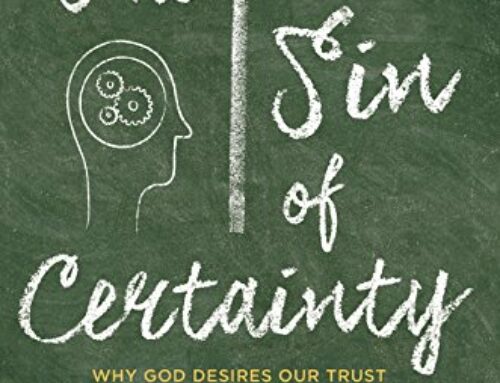Are Faith and Doubt Compatible?
June 21, 2020
Categories: Faith
I’m part of a grant that is exploring the idea of faith and trust in God. It’s an interesting group—we have a combination of philosophers, theologians, and psychologists. We’re all trying to nail down what true faith in God involves.
Faith as Certainty of Belief
The church has a long history of associating faith with certainty of belief. When I was growing up, having “faith” in Jesus meant you believed that Jesus was who he said he was. And you had to be sure about it. If you expressed some doubts or changed your mind about something, people started to get concerned that you were “backsliding.”
Defining faith as being certain that what you believe is true is challenging for a lot of folks, especially those who are committed to learning about different perspectives. Growing up, we are taught a certain set of beliefs, but then we experience the complexities of life. Maybe we are convinced in our college biology course that evolution is true. Perhaps we have a family member or close friend who identifies as gay or transgender, and we can’t square their experience with what we were taught growing up. Maybe we take a class about the New Testament or the historical Jesus, and realize the Bible isn’t quite as neat and tidy as we were taught growing up.
Doubt
For many people, these experiences can create a sense of doubt. When you define faith as certainty of belief, these doubts can be doubly problematic. Not only are the doubts there, which can be anxiety-provoking, but it might mean that you are losing your faith. Yikes! Sometimes people just ditch their faith when this happens, because they believe faith is incompatible with doubt.
Faith as Trust
One of the key shifts our group is proposing is to define faith less as certainty of belief and more as trust. Trust is more resilient than certainty of belief. You can trust and maintain relationship even in the midst of doubt. Your certainty might rise and fall over the course of your life. But trust and commitment can withstand some uncertainty.
Jesus, Faith, and Trust
One of my favorite passages in the Bible that illustrates this point is in the Gospel of Mark. In the passage, a father approaches Jesus and asks him to heal his son. But as you can see, the father experiences some doubt. Let’s see how Jesus responds (Mark 9:14-27).
When they came to the other disciples, they saw a large crowd around them and the teachers of the law arguing with them. As soon as all the people saw Jesus, they were overwhelmed with wonder and ran to greet him.
“What are you arguing with them about?” he asked.
A man in the crowd answered, “Teacher, I brought you my son, who is possessed by a spirit that has robbed him of speech. Whenever it seizes him, it throws him to the ground. He foams at the mouth, gnashes his teeth and becomes rigid. I asked your disciples to drive out the spirit, but they could not.”
“You unbelieving generation,” Jesus replied, “how long shall I stay with you? How long shall I put up with you? Bring the boy to me.”
So they brought him. When the spirit saw Jesus, it immediately threw the boy into a convulsion. He fell to the ground and rolled around, foaming at the mouth.
Jesus asked the boy’s father, “How long has he been like this?”
“From childhood,” he answered. “It has often thrown him into fire or water to kill him. But if you can do anything, take pity on us and help us.”
“If you can?” said Jesus. “Everything is possible for one who believes.”
Immediately the boy’s father exclaimed, “I do believe; help me overcome my unbelief!”
When Jesus saw that a crowd was running to the scene, he rebuked the impure spirit. “You deaf and mute spirit,” he said, “I command you, come out of him and never enter him again.”
The spirit shrieked, convulsed him violently and came out. The boy looked so much like a corpse that many said, “He’s dead.” But Jesus took him by the hand and lifted him to his feet, and he stood up.
Pisteuo
The key Greek word in this passage is pisteuo, which can be translated as belief, faith, or trust. But as you can see in this passage, the father wasn’t certain about his belief. But he did trust in Jesus. In turn, Jesus blesses the father’s trust and heals his son.
Discussion
How do you define faith? What do you think of defining faith as trust rather than being certain about one’s belief?

Related Thoughts

Subscribe To My Newsletter
Join my mailing list to receive the latest blog posts.
Receive my e-book “The Mental Health Toolkit” for free when you subscribe.




